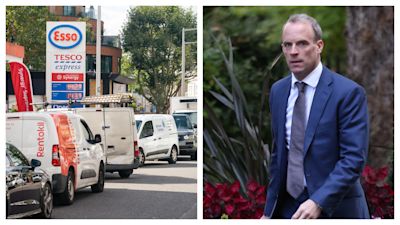Ex-prisoners and low-level offenders could drive lorries to help shortages, says Raab

Has the situation at petrol stations improved? ITV News Midlands Correspondent Ben Chapman reports from a Birmingham forecourt
Low-level offenders could be used to help the HGV driver shortage amid food supply chain concerns and chaos at fuel pumps, the deputy prime minister has said.
Dominic Raab suggested giving former prisoners and offenders serving community sentences haulage work to help plug the shortage and cut re-offending.
“We’ve been getting prisoners and offenders to do volunteering and unpaid work,” Mr Raab told The Spectator, in comments carried by The Times.
“Why not if there are shortages encourage them to do paid work where there’s a benefit for the economy, benefit for society?
“If you give people skin in the game, give them something to lose, if you give them some hope, they’re much less likely to re-offend.”
The former foreign secretary reportedly said he would also be "open-minded" about allowing asylum seekers to work while their claims are being processed to further help the country's labour shortage.
But he dismissed Labour's calls for 10,000 migrant visas to be issued to resolve the problem fearing it would leave the UK "reliant in the long-term on the predicament of cheap labour coming in from abroad".
Panic buying at the fuel pumps sparked by concerns a lack of lorry drivers would scupper supplies has led to snaking queues and pockets of aggression at petrol stations over the last week.
Despite ministers saying there is enough fuel for everyone, motorists still say they are pulling up to stations that have run dry or are having to queue for up to hours to fill up their vehicles.
Health and care workers say this is having a detrimental knock-on effect on their patients, with one care worker - who ITV News went out on the road with - showing up an hour late for an elderly patient who was forced to wait in a wet bed.
Meanwhile, some food and drink manufacturers are struggling to access the supplies of carbon dioxide they need despite production having resumed at CF Industries.
ITV News has learned that AB InBev is having difficulty accessing enough CO2 for the beer it makes, limiting the production of Budweiser, Stella and Becks.
Business Secretary Kwasi Kwarteng said soldiers are set to drafted in to drive tankers in the next couple of days to help alleviate supply chain issues.
Ministers said they expected the situation to improve further, with the first troops driving tankers expected to appear on the roads “in the next couple of days”.
Some roads around London have become gridlocked as motorists hunted for stations that have fuel, with some carrying petrol cans, plastic jugs and water bottles to stock up, and there were even reports of violence in a handful of places.Executive director of The Petrol Retailers Association (PRA), Gordon Balmer, said forecourt staff were being subjected to a “high level” of physical and verbal abuse from frustrated motorists.
“There are encouraging signs that the crisis at the pumps is easing, with forecourts reporting that they are taking further deliveries of fuel,” he said in a statement.
“However, we are extremely disappointed to hear many forecourt staff are experiencing a high level of both verbal and physical abuse, which is completely unacceptable.”
His warning comes amid reports of fights breaking out on forecourts with, in one case, footage appearing on social media of a man wielding a knife, as tempers boiled over during long waits to fill up.
Earlier, Mr Kwarteng said the situation appeared to be “stabilising” with most people “behaving quite responsibly”.
As well as deploying troops, he said the government was sending out vehicles from its reserve tanker fleet, driven by civilian drivers, to provide “additional logistical capacity” to the industry.
“It takes, sometimes, a few days to get troops on the ground,” Mr Kwarteng told reporters. “We have decided to do that.
“I think in the next couple of days you will see some soldiers driving tankers,” he said.
Altogether 150 military drivers, together with 150 drivers’ mates, have been on standby since Monday to carry out deliveries to filling stations.
Figures from the Department for Transport have shown there is a backlog of more than 56,000 applications for vocational driving licences, including HGV and bus permits, waiting to be processed.
Ministers have blamed the pandemic, which led to the cancellation last year of tens of thousands of tests.